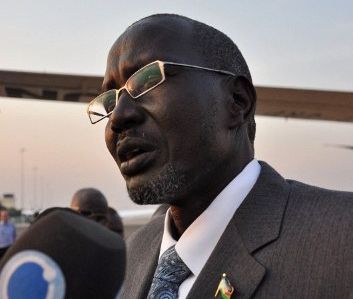South Sudan will resume exporting oil through north only if “fair deal” reached
By Ngor Arol Garang
January 21, 2012 (JUBA) – South Sudan on Saturday said it will resume exporting its crude oil to international markets through north Sudan if the government in Khartoum agrees to a “fair” transit fee and returns confiscated oil.

The landlocked country is considering building a pipeline to the Kenyan port of Lamu to avoid using north Sudan’s Port Sudan.
Dau said his ministry was determined to exert all efforts including pursing legal measures to return the oil, which he said has been stolen by Khartoum.
“We will not just stop with the closure of the pipeline. We will proceed with all legal processes and procedures to retrieve the oil which has been stolen by Khartoum throughout 2011. We will never give up until the stolen oil is brought back to its rightful owners,” he said.
Dau also warned potential buyers that legal procedures would be taken to trace any companies that buys its oil from north Sudan.
North Sudan says the oil has been taken as payment in kind for unpaid fees of up to $1 billion. However, South Sudan says that it has paid the north to use its pipelines and refineries claiming that $350 million worth of its oil has already been diverted and $400 million of it has been prevented from leaving from leaving Port Sudan.
Sudan wants $36 a barrel as a transit fee, which is roughly a third of its value, and for Juba to share the north’s $38 billion national debt. Juba wants to pay a much smaller fee similar to the rate Chad pays to export it’s oil through West Africa.
From 2005 until July last year the north and south shared South Sudan’s oil 50:50 as part of a peace deal that ended decades of conflict. But no agreement was made on what arrangements would replace the deal once South Sudan became independent in July 2011.
South Sudan’s oil minister said his government is aware of the challenges associated with the closure of production, which is expected to take up to two weeks to complete.
Juba says it will be able to last for up to 18 months without exporting oil if Khartoum does not change its stance, estimating that it would take less than a year to build the pipeline.
Khartoum has said that the decision will damage both country’s economies. But Sudan’s president Omer Hassan al-Bashir has recently admitted that his country will be negatively affected if the South decides to halt oil production, but warned that Juba has more to lose from such step as revenues from oil make up 98% of the Southern budget.
After South Sudan took 75% of Sudan’s oil with it when it seceded, the north’s finances have been seriously effected, triggering inflation and higher food prices due to a lack of hard currency.
Dau admitted that shutting down the pipeline was not in South Sudan’s interest but said that it was the only option it could make in order to protect its resources.
In a letter seen by Sudan Tribune on Saturday Minister Dau gave a timeline of Juba’s version of events:
- On the 24th Dec. 2011, government of Sudan (GOS) prevented loading of 600,000 bbls of South Sudan-Nile blend;
- On the 30th, Dec. 2011, GOS detained 1000,000 bbls Dar blend sold to Vitol;
- On the 31st, Dec. 2011, GOS prevented ships from loading 600,000 bbls of RSS Nile blend;
- On the 3rd, Jan. 2012, GOS detained vessels loaded with 600,000 bbls of Dar blend of RSS which belongs to Petronile;
- On the 8th, Jan. 2012, GOS detained Sinopec vessels loaded with 900,000bbls Dar blend of RSS;
- On the 13th, Jan. 2012, GOS lifted 605,784 bbls Dar blend crude oil of RSS;
- On the 16th, Jan. 2012, GOS lifted by force 618712 bbls Dar blend crude oil of Republic of South Sudan.
- Also on the same date, GOS instructed PDOC to transfer 120,000 bbls of Dar blend crude oil of RSS to be delivered to Khartoum refinery directly from the illegal pipeline tie into KRC which was partly constructed and operated by GOS;
- On the 19th, Jan. 2012, GOS lifted by force 600,000 bbls of RSS’ Nile blend crude oil.
The two neighbours have to come to agreement on a host of post-secession issues including national debt, assets, border demarcation, the disputed oil producing region on Abyei and citizenship.
South Sudan said on Friday that it will continue to negotiate with Khartoum over post-independence issues despite announcing that it was halting oil production over the transit fees dispute.
So far the African Union mediated talks, led by former South African president Thabi Mbeki, have failed to resolve the dispute.
Relations have also been strained with both accusing the other of supporting rebels in their territory. Both countries deny this.
(ST)
